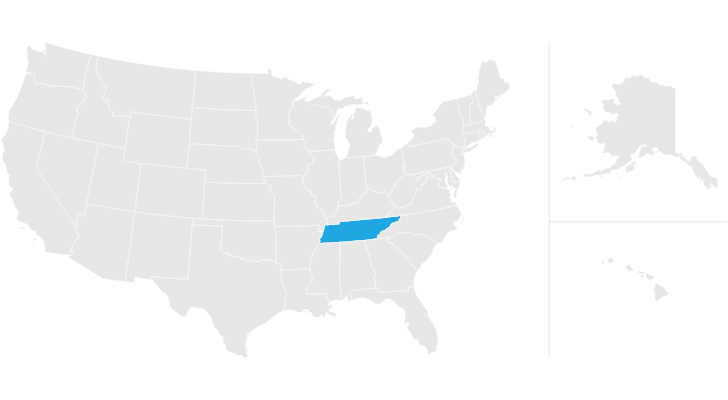
Tennessee does not have an estate tax, regardless of the size of your estate or any other factors. At one point, Tennessee did have an inheritance tax, but this has been repealed as of Dec. 31, 2015. Tennesseans still need to adhere to the federal estate tax though. However, this will only apply to a select group of people who have high enough estate values, as the 2024 federal estate tax exemption is $13.61 million.
You may find it helpful to prepare your estate with the help of a professional. Find a financial advisor today.
Tennessee Estate Tax
Tennessee does not have an estate tax. It is one of 38 states with no estate tax.
What Is the Estate Tax?
Also referred to as the “death tax,” the estate tax is levied on the estates of people who have recently died. The estate tax applies before the money and assets in the estate are passed on to a decedent’s designated heirs. The estate tax only applies to estates valued above a certain threshold, which is legally determined by the government levying the tax.
The inheritance tax is different from the estate tax. The inheritance tax applies to money and assets after distribution to a person’s heirs.
Tennessee Inheritance and Gift Tax

Tennessee does not have an inheritance tax either. There is a chance, though, that another state’s inheritance tax will apply if you inherit something from someone who lives in that state. Kentucky, for instance, has an inheritance tax that applies to all property in the state, even if the person inheriting it lives elsewhere. If someone living out of state leaves you an inheritance, check local laws so that you don’t end up missing a tax payment.
Tennessee also has no gift tax. There is a federal gift tax, though, which has an annual exemption of $18,000 per year for each gift recipient, as of 2024. If you give one person more than $18,000 in a single year, you must report that gift to the IRS. Any amount gifted to one person over that limit counts against your 2024 lifetime gift tax exemption of $13.61 million. It also reduces your federal estate tax exemption.
Federal Estate Tax
Though Tennessee has no estate tax, there is a federal estate tax that may apply to you if your estate is of sufficient value. There is a $13.61 million exemption for the federal estate tax in 2024, which is up from the $12.92 million exemption for 2023. The federal exemption is portable for married couples. This means that a married couple can apply both of their exemptions to their estate after they both die. With the right legal maneuvers, a married couple can protect up to $27.22 million.
Estates worth more than the exemption are subject to an estate tax with ascending rates, topping out at 40%. Here is an example:
Let’s consider an estate worth $15.55 million that belongs to an unmarried individual. To determine the total estate tax burden, you’ll first need to subtract the $13.61 million exemption, leaving a taxable estate of $1.94 million. The first $1 million has a base tax payment of $345,800. An additional 40% is owed on the remaining $940,000, which totals $376,000. Add that figure to the base rate and you’ll get the total estate tax burden for this estate, which is $721,800.
Federal Estate Tax Rates
| Taxable Estate* | Base Taxes Paid | Marginal Rate | Rate Threshold** |
| $1 – $10,000 | $0 | 18% | $1 |
| $10,001 – $20,000 | $1,800 | 20% | $10,001 |
| $20,001 – $40,000 | $3,800 | 22% | $20,001 |
| $40,001 – $60,000 | $8,200 | 24% | $40,001 |
| $60,001 – $80,000 | $13,000 | 26% | $60,001 |
| $80,001 – $100,000 | $18,200 | 28% | $80,001 |
| $100,001 – $150,000 | $23,800 | 30% | $100,001 |
| $150,001 – $250,000 | $38,800 | 32% | $150,001 |
| $250,001 – $500,000 | $70,800 | 34% | $250,001 |
| $500,001 – $750,000 | $155,800 | 37% | $500,001 |
| $750,001 – $1 million | $248,300 | 39% | $750,001 |
| Over $1 million | $345,800 | 40% | $1,000,001 |
*The taxable estate is the total above the 2024 federal exemption of $13.61 million.
**The rate threshold is the point at which the marginal estate tax rate kicks in.
Overall Tennessee Tax Picture

Tennessee is tax-friendly for retirees. The state does not tax Social Security income nor does it tax withdrawals from retirement accounts like 401(k) plans or income from public or private pensions. This means the state will not tax any money you earn during retirement, including any wages made from a post-retirement job. Property taxes in Tennessee are very low as well, with an average effective rate of 0.66%.
Estate Planning Tips
- A financial advisor can help you build an estate plan. Finding a financial advisor doesn’t have to be hard. SmartAsset’s free tool matches you with up to three vetted financial advisors who serve your area, and you can have a free introductory call with your advisor matches to decide which one you feel is right for you. If you’re ready to find an advisor who can help you achieve your financial goals, get started now.
- Though you may be tempted to just plan your estate by yourself, there are serious dangers to DIY estate planning. Seriously consider finding an advisor or a lawyer to help you through the process.
Photo credit: ©iStock.com/benkrut, SmartAsset, ©iStock.com/scyther5